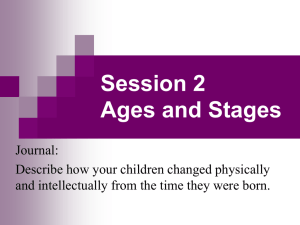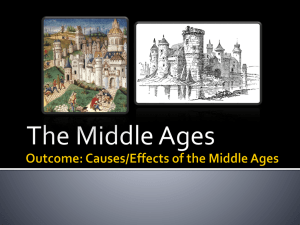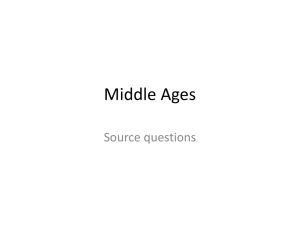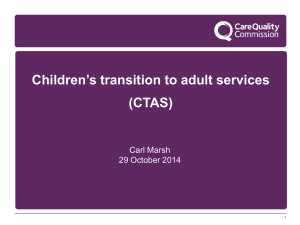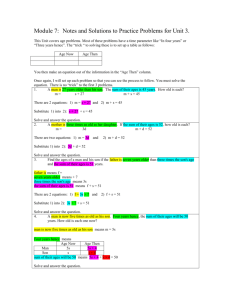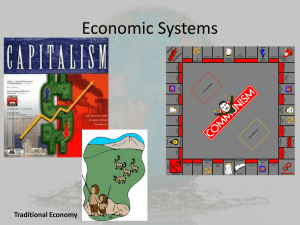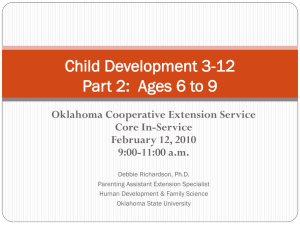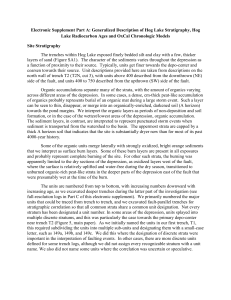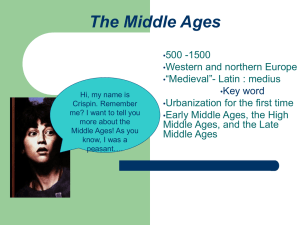Time, Money, Chores - Intermediate District 287
advertisement
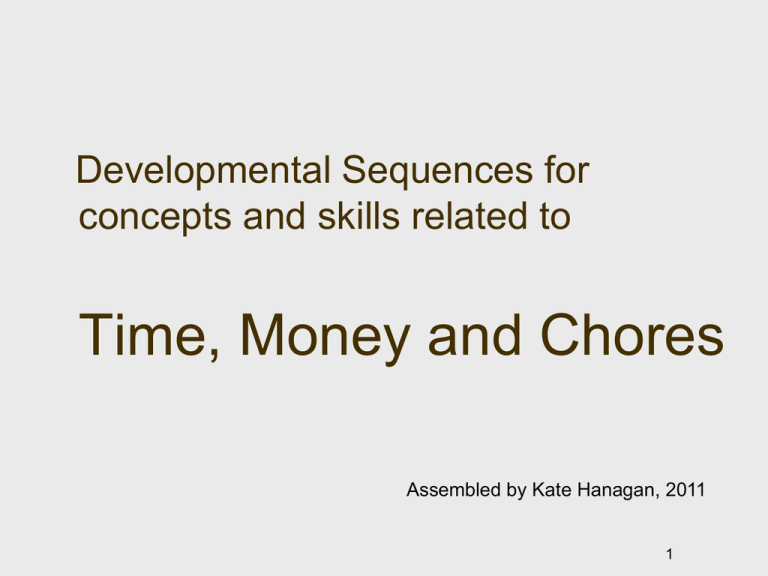
Developmental Sequences for concepts and skills related to Time, Money and Chores Assembled by Kate Hanagan, 2011 1 Why look at typical development? It can be helpful to revisit a typical developmental sequence of these concepts and skills as we set expectations for our students Often the sequence of development remains the same even while delayed 2 Children and Time: What They — Usually — Know When Written By Lynne Bertrand • http://wondertime.go.com/learning/ article/0806-children-and-time.html Babies Babies-anticipate feeding 4 12 to 15 months Sequence experiments rule. She drops her cup, you pick it up. Again? Again? 5 By 21 months The power word "now" sees heavy use. "Soon" still means nothing to him. He can put together familiar clues and anticipate what comes next. "Mommy home?" he says when the Harley roars into the driveway. 23 2 years to 2 1/2 years Lives in the present and uses words to show it: "Now," "dis day." He may be able to wait one nanosecond for his sandwich when you say "soon." The idea of "playtime after snack time" at day care means a bit more to him now. 24 2 years to 2 1/2 years He's starting to use words for the future, such as "I gonna." He has no words yet for things past, although he's using past tenses of verbs: "I goed there." 8 2 1/2 to 3 years Her time vocabulary blossoms. Out roll 20 or more new time words, including some personal catchall terms like "last day" for the gigantic past. Sentences map things on a timeline: Me eat, then play. 25 3 to 3 1/2 years Here, researchers begin to see wide variations in children's orientation in time. Mostly, he shows a more refined use of time words for sequence ("I had it first"), frequency ("two times today"), rhythm ("every Friday"), and duration ("it's a long time"). "Yesterday" debuts, but without accuracy: "I'm gonna see the ducks yesterday." 26 4 to 5 years A child is at home, verbally, in past, present, or future and is getting verb tenses right. The words "day," "week," and "time" are dragged off the shelf a lot, with phrases: "every day," "summertime," "next week." what time she goes to bed or eats supper. 27 4 to 5 years She says and actually means "in a minute," "five minutes ago." She has some sense of holidays and birthdays. Most likely she can't tell you correctly yet what time she goes to bed or eats supper. 12 5 to 6 years She uses most time words correctly now, no longer confusing the past with the future. She knows the days of the week and can tell you what day it is, what day comes next, how old she is, and when she goes to bed. 13 5 to 6 years She's using those expressions of the clock ("The big hand is at the bottom") but likely can't tell time yet. 14 6 years He likes to hear about times past, particularly his own and his parents' misadventures. He likes to think about things in sequence. He travels in his mind into the future, anticipating holidays and birthdays. He has a notion of the sequence of grandparent to parent to15 6 years He travels in his mind into the future, anticipating holidays and birthdays. He has a notion of the sequence of grandparent to parent to child. He still likely can't tell time by the clock. 16 7 to 10 years A child in the years from 7 to 10 gains real competence with both clock and calendar, and the math to use in reading them. 17 Source • http://wondertime.go.com/learning/article/0 806-children-and-time.html 18 Easy Money Written By Catherine Newman Easy Money: 21 Ways to Teach Kids About the Green Stuff - Child Development | Wondertime 19 Birth to 1 year Its first appeal is as a shiny, forbidden thing, a glass jar of gleaming coins she can't even reach, never mind touch. 20 Ages 1 to 2 years "At around 12 months dumping sets in," says Claudia Quigg. 21 Ages 2 to 3 years After dumping comes the stacking of coins, the flinging, and then "counting," very loosely defined. "Without the concept of one-to-one correspondence" — meaning each number relates to an object — "kids are still just rattling off the names of numbers.” 22 Ages 3 to 4 The Sorting Years. "To sort, you need to conceptualize what makes things the same," He can separate the silver coins from the copper ones,big from the little, ridged from the smooth. 23 Ages 4 to 5 Have truly learned to count can start to think about coins in terms of value and equivalence: a pair of dimes is 2 but also 20 cents; a quarter is 25 pennies, 5 nickels, or 2 dimes and 1 nickel. 24 Ages 5 to 6 Their understanding of basic math deepens. Barbara B. McGrath identifies money as a favorite counting tool (after candy and snacks, of course). "hands-on manipulatives" are a good way to ensure an interest in math. 25 Ages 6 to 7 They begin to (fitfully) grasp fiscal abstraction. "Stores should just keep a bucket of money by the cash register," my son once mused. "It would make it so much easier for everyone to buy things." 26 Ages 6 to 7 Concepts like how you can spend money when you don't have it, how you get it, and what it pays for are hard enough for adults to grasp — it's no surprise most children are mystified by them. Kids may be baffled that an entire box of toothpicks costs a mere 79 cents ("Didn't someone have to whittle all of those?"). 27 Ages 7 to 8 With allowance comes deferred gratification, earned interest, and learned generosity. And when your kids become historians of inflation ("A Coke really cost five cents?" we asked then; "Candy bars were only 25 cents?" 28 Ages 9 to 10 As the complexity of mathematics multiplies, money buys your child a reallife occasion to practice new skills. "It's a fantastic way to learn about decimals and place value," "But fractions are trickier. 29 Ages 11 to 12 Quigg describes financial abstraction as "an ever-evolving understanding," and now the age of innocence is past. Big kids are full of hard questions about loans and credit. 30 The Right Chore for the Right Age By Cheryl Roberts Choose the Right Chore for the Right Age - Child Development | Wondertime 31 12-month-olds: "Great imitators." Characteristic: Newfound mobility Skill: Grasp and release Good jobs: Picking up toys to drop in a bin Smoothing bed covers, sweeping — by imitating 32 18-month-olds: "Can't do everything they think they can." Characteristics: Problem solving; new attention span Skills: Strength and coordination Good jobs: Serving from a tray Watering a garden, washing produce Helping to feed or groom a pet Using a mechanical carpet sweeper 33 2-year-olds: "Routine and ritual are very important." Characteristics: Increased hand-eye coordination and concentration Skills: Following directions, sorting Good jobs: Spreading peanut butter or cheese Dusting, sweeping, wiping a counter, washing windows Sorting laundry, silverware, toys Washing, stirring, mashing food 34 3-year-olds: "Work is still play." Characteristic: More awareness of significance of help Skills: Sorting and arranging Good jobs: Setting the table Using kitchen gadgets, with supervision: sifter, rolling pin, cheese grater, mortar and pestle Planting, weeding, raking, digging, arranging flowers Pouring tasks 35 4-year-olds: "Love anything new and relish their independence." Characteristics: Increased precision; increased sense of responsibility Skills: Making things; taking things apart and putting them back together Good jobs: Using still more gadgets: peeler, pitter, slicer, food mill, juicer, whisk, even — with close supervision — a true paring knife Hanging wash on a line, neatly folding dry clothes 36 5-year-olds: "Like to please." Characteristics: Sense of confidence; expanded curiosity about how things in the house work Skills: Understanding what a job is; tackling even uninteresting jobs Good jobs: Big supervised jobs, such as vacuuming or taking out trash Behind-the-scenes jobs, such as removing the vacuum bag or coming along to the dump 37 6-year-olds: "Full of energy and enthusiasm." Characteristic: Independence Skills: Beginning reading and math Good jobs: Measuring — for recipes, pet food, laundry soap Reading to a younger sibling Noticing what needs to be done, and helping out 38 Hope this sparked some ideas! 39 40 41
